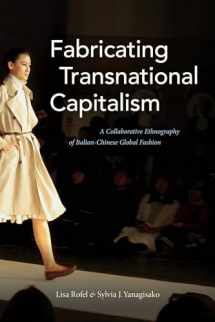
Fabricating Transnational Capitalism: A Collaborative Ethnography of Italian-Chinese Global Fashion (The Lewis Henry Morgan Lectures)
Book details
Summary
Description
In this innovative collaborative ethnography of Italian-Chinese ventures in the fashion industry, Lisa Rofel and Sylvia J. Yanagisako offer a new methodology for studying transnational capitalism. Drawing on their respective linguistic and regional areas of expertise, Rofel and Yanagisako show how different historical legacies of capital, labor, nation, and kinship are crucial in the formation of global capitalism. Focusing on how Italian fashion is manufactured, distributed, and marketed by Italian-Chinese ventures and how their relationships have been complicated by China's emergence as a market for luxury goods, the authors illuminate the often-overlooked processes that produce transnational capitalism—including privatization, negotiation of labor value, rearrangement of accumulation, reconfiguration of kinship, and outsourcing of inequality. In so doing, Fabricating Transnational Capitalism reveals the crucial role of the state and the shifting power relations between nations in shaping the ideas and practices of the Italian and Chinese partners.


We would LOVE it if you could help us and other readers by reviewing the book
Book review



